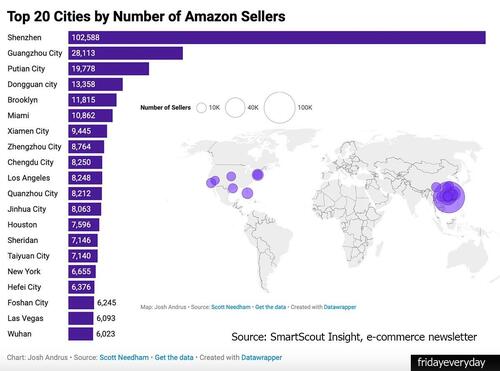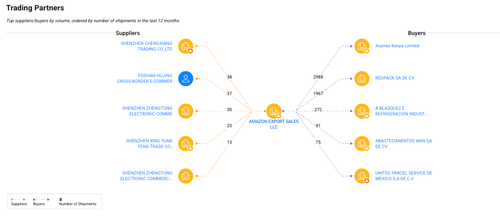President Trump announced an increase in tariffs on Chinese imports to 125% on Wednesday afternoon, following the Chinese government's move to raise tariffs on U.S. goods to 84%. So far, the Chinese Communist Party has not taken retaliatory action on the latest tariff round. These steep tariffs are poised to crush Chinese sellers that have long dominated Amazon's marketplace by flooding the U.S. with cheap junk.
Data from SmartScout shows that most of Amazon's sellers are based in China. Over the years, Chinese sellers have figured out how to cut out intermediaries and use Amazon as a direct-to-consumer marketplace for low-cost goods such as electronics, toys, household items, and fashion accessories.
Now, the crushing blow of tariffs has sparked turmoil for Chinese sellers.
Wang Xin, head of the Shenzhen Cross-Border E-Commerce Association—which represents over 3,000 Amazon sellers—told Reuters, "This isn't just a tax issue; the entire cost structure gets completely overwhelmed," adding, "It'll be very hard for anyone to survive in the U.S. market."
Wang called President Trump's tariff war a "truly an unprecedented blow."
Reuters spoke with other sellers about the turmoil unfolding in China:
Of the five sellers who spoke to Reuters, three said they would look to raise prices for their exports to the U.S., while two planned to leave the market entirely.
Dave Fong, whose products range from schoolbags to Bluetooth speakers, said on Thursday he has raised prices in the U.S. by up to 30% and would let inventory levels fall and lower spending on Amazon advertising fees, which once took up 40% of his U.S. revenue.
"For us and anyone else, you can't rely on the U.S. market, that's quite clear," Fong said. "We have to reduce investment, and put more resources into regions like Europe, Canada, Mexico and the rest of the world."
On Wednesday, word spread that a document viewed by Bloomberg specified that Amazon reduced its exposure by slashing shipments of Chinese products.
Trade data via the supply chain platform Sayari shows that Amazon suppliers are primarily based in China.
Brian Miller, who has sold on Amazon from China for seven years, told Reuters, "I don't see a scenario, if things don't change, that serving the U.S. from China is viable anymore and manufacturing that serves the U.S. will have to be transferred to other countries like Vietnam, or Mexico."
Why sellers did not heed Trump's warning about the tariff war for the last decade is beyond comprehension and inexcusable—clearly their loss. And for those who listened and either friend-shored or re-shored supply chains out of China ...
The silver lining is that high tariffs on China will begin to stop cheap Chinese junk flooding this nation. Americans need to detox from their obsession with cheap Chinese products that routinely break or come broken.
Done this before.
Now comes the hard part of restarting America's industrial base.
Loading...



